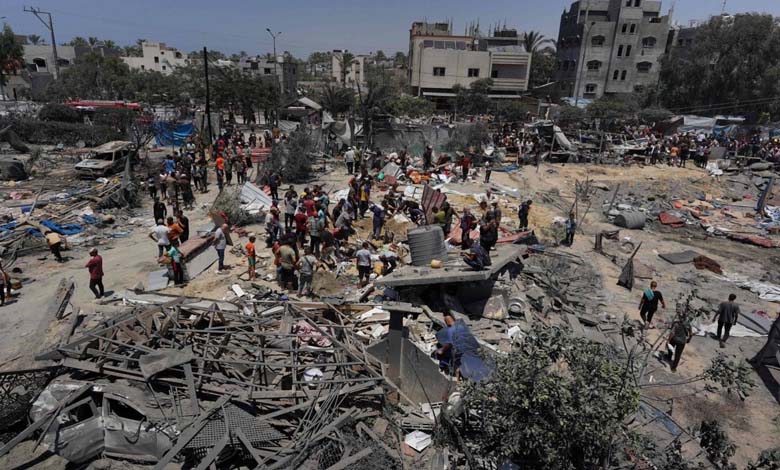Mutual accusations between Hamas and Israel delay ceasefire agreement

The Palestinian movement says the occupation imposed new conditions and obstacles that prevented the completion of ceasefire negotiations, while Netanyahu accused it of lying and violating previous agreements.
On Wednesday, the Palestinian Hamas movement and Israel exchanged accusations regarding the delay in reaching a ceasefire agreement and securing the release of hostages in Gaza, despite efforts by mediators to reach an agreement.
-
Under a Tight Siege, Israel Expands Its Attack in Northern Gaza amid Reports of Hamas Activity
-
After new demands from Hamas and Israel’s intransigence… have the Gaza truce negotiations stalled?
Recent indirect negotiations have taken place between Israel and Hamas, mediated by Qatar, Egypt, and the United States in Doha, raising hopes of an agreement.
Hamas announced Wednesday that the “new conditions” imposed by Israel had delayed the ceasefire agreement in Gaza, but described the ongoing negotiations in Doha as “serious.”
In a statement, Hamas explained that “the occupation imposed new issues and conditions regarding withdrawal, ceasefire, prisoners, and the return of displaced persons, which delayed the conclusion of the agreement that was within reach.” It added that “the ceasefire and prisoner exchange negotiations in Doha, mediated by Qatar and Egypt, are progressing seriously, and the movement has shown responsibility and flexibility.”
-
Exchange of Accusations Between Israel and Hamas Over the Killing of Six Hostages
-
Hamas After the Bombing of Khadija School: Israel Lies and Does Not Want to Stop Its Aggression
Israel quickly responded, accusing Hamas of placing “new obstacles” to reaching an agreement.
A statement from the office of Prime Minister Benjamin Netanyahu said: “The terrorist organization Hamas is lying once again, violating already reached agreements and continuing to create obstacles in the negotiations.”
On Monday, Netanyahu told Knesset members that there had been “some progress” in negotiations aimed at securing the release of hostages in Gaza, after more than 14 months of war.
-
Have negotiations between Israel and Hamas reached a deadlock?
-
Suspicious Relationship Between Israel and Hamas… Facts and Testimonies
Last week, Hamas, in a joint statement with Islamic Jihad and the Popular Front for the Liberation of Palestine, announced that reaching a ceasefire agreement with Israel was “closer than ever,” as long as the Israeli state did not impose “new conditions.”
In Israel, some relatives of the hostages still held in Gaza urged Netanyahu to reach an agreement. Sharon Sharabi, whose two brothers were kidnapped during the Hamas attack on October 7 of last year, stated in a statement from Tel Aviv: “It is time to bring them back. Netanyahu, it’s up to you… It’s time, don’t wait,” while the Israeli army confirmed that one of the kidnapped brothers had died in captivity.
-
Hamas calls for an international investigation in Gaza and accuses the Israeli occupation of committing these crimes against civilians
-
Hamas intensifies its defense of Gaza after Israel expands its ground attacks
The war in Gaza erupted following an unprecedented attack by Hamas on southern Israel, resulting in the deaths of 1,208 people on the Israeli side, most of whom were civilians, according to official Israeli data. This toll includes hostages who were killed or died in captivity.
Since the start of the war between Israel and Hamas, at least 45,361 people have been killed in Gaza, most of them civilians, women, and children, according to data from the Hamas-run Ministry of Health in Gaza, which the United Nations deems reliable.
-
A Tumultuous Year: Winners and Losers in Global Politics in 2024
-
“Jerusalem in 2024”: An Israeli Iron Wall over the Ruins of Diplomatic Missions
Negotiations have faced numerous challenges since the only ceasefire, which lasted a week, in November 2023. The primary point of contention remains the establishment of a permanent ceasefire in Gaza. Other thorny issues also include the future governance of the Palestinian territory after the war.
In an interview with the Wall Street Journal last week, Netanyahu said, “I will not agree to end the war before we uproot Hamas,” adding that Israel “will not leave Hamas in power in Gaza, 30 miles from Tel Aviv. That will not happen.”
-
Water Crisis in Gaza: Human Rights Watch Accuses Israel of Genocide
-
Gaza and the West Bank in 2024: Numbers Unveil a “Tragedy”
For his part, Israeli Defense Minister Israel Katz confirmed Wednesday that “Gaza’s security will remain in the hands of the Israeli army,” adding that “there will be no Hamas authority or Hamas military organization in Gaza.”
Mahmoud Bessal, a spokesperson for Gaza’s Civil Defense, stated that at least 17 people were killed in Israeli airstrikes on Wednesday, “including women and children.”
-
Details of the “Gaza Truce”: Disputes over “Prisoners” and Flexibility on the “Israeli Withdrawal”
-
“Including Syria and Lebanon”: How the Israeli Army Prepares for “Operation Winter”












